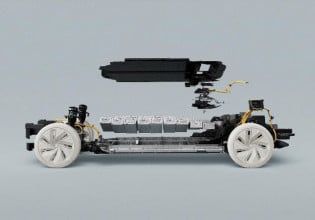NXP Controller Targets Battery Temperature, Safety
NXP’s battery cell controller offers improved battery monitoring across a range of temperatures and voltages. This article examines why EV battery management is so difficult and details NXP’s battery cell controller.
As the auto industry moves closer to electric vehicles (EVs), it faces significant challenges. In particular, EV batteries' growing complexity, size, and cell count pose a daunting task of battery management and ensuring the utmost performance, lifetime, and safety.
Electric vehicle batteries. Image used courtesy of Kia
Recently, NXP released a battery cell controller IC designed to provide higher levels of safety and reliability in automotive battery management. This article will review why EV battery management is so difficult and dive into the details of NXP’s new IC.
Challenges in Battery Management
Lithium-ion batteries are the backbone of modern electric vehicles, but efficiently managing and monitoring them is extremely difficult.
For instance, a typical high-voltage lithium-ion battery system is composed of hundreds of cells connected in series. One major challenge lies in ensuring the uniformity and balance of these cells throughout the battery's lifespan, which requires precise state-of-charge estimations under various conditions.
The anatomy of an EV battery. Image used courtesy of ResearchGate
As part of this, battery management is needed to accommodate temperature variations, which can significantly impact battery efficiency and lifespan. Fluctuations can lead to significant variances in the battery's efficiency and lifespan, necessitating a battery management system (BMS) that can accurately monitor and adapt to these changes. In the same vein, there is a need for consistent performance over the years-long lifecycle of these batteries, encompassing thousands of charge-discharge cycles under different environmental conditions.
Moreover, safety remains a paramount concern. The BMS must mitigate risks associated with high-voltage lithium-ion batteries, such as thermal runaway and uneven charging, which can lead to reduced battery life or, in extreme cases, safety hazards.
NXP's Battery Management IC
To address these challenges, NXP developed the MC33774 battery management IC.
The MC33774 is an 18-channel battery cell controller IC designed for monitoring lithium-ion batteries in automotive applications. To this end, the chip supports 4 to 18 cells per device and provides ISO 26262 ASIL D support for cell voltage and temperature measurements. NXP states the device can achieve a lifetime qualification for less than 2 mV of voltage measurement error across the full temperature and cell voltage ranges of -40°C to +125°C and -5 V to 5 V, respectively.
MC33774 addresses major challenges in automotive battery management. Image used courtesy of NXP
One of the most notable features of the chip is the high cell measurement accuracy, down to ±0.8 mV. This level of precision is crucial in maximizing the usable capacity of various cell chemistries, including nickel manganese cobalt and lithium iron phosphate.
The device's ability to deliver accurate cell measurement data across a broad temperature range is pivotal in ensuring performance and longevity, facilitating precise range predictions for EVs.
The controller also features onboard passive cell balancing with up to 200 mA average cell balancing, incorporating diagnostics, automatic odd/even balancing sequence, and timer, voltage, temperature, and PWM-controlled balancing.
Better Battery Management Leads to Better EV Batteries
In the pursuit of better EV performance, the focus is often on battery technology. However, it doesn’t matter how good the battery is without proper battery management. That’s why NXP’s MC33774 is an important development: it enables high levels of reliability and accuracy in automotive battery management across a range of operating conditions. With the new IC, the company hopes EV batteries can be safer and offer longer operating lives.









